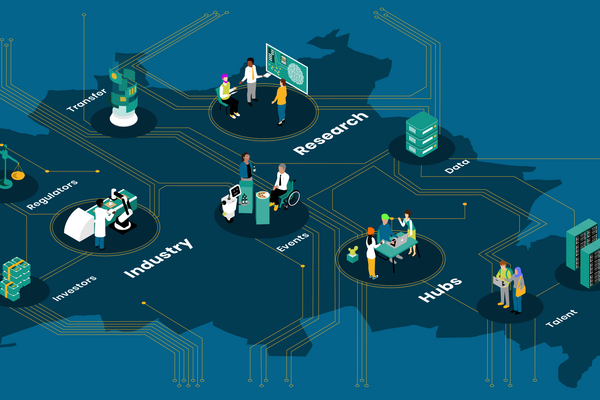How Berlin’s FinTech Companies Contribute to Reach the UN’s Sustainable Development Goals
Berlin’s FinTech 101: Exploring sustainable development and finance
Berlin is not only Germany’s vibrant capital, it’s also a hotspot for innovation, creativity, and sustainability. The city’s FinTech sector plays an important role in supporting the United Nations’ Sustainable Development Goals, combining cutting-edge technology with a commitment to social and environmental responsibility.
In the landscape of modern finance and sustainable development, several terms have emerged to encapsulate key concepts and practices. One such framework is the Sustainable Development Goals (SDGs), a set of 17 global goals established by the United Nations to address social, economic, and environmental challenges around the world by 2030. These goals range from ending poverty and hunger to promoting gender equality and sustainable cities.
ESG, another concept, includes environmental, social, and governance criteria that guide investors in assessing a company’s sustainability and ethical impact. Environmental criteria evaluate a company’s environmental footprint, while social criteria focus on a company’s relationships with employees, communities, and society. Governance criteria evaluate leadership, ethics, and transparency.
While sustainable finance currently emphasizes the environmental dimension, FinTechs have the potential to impact the social and governance dimensions. Their innovative solutions can address social inequalities and improve governance practices. In this way, FinTech innovations broaden the scope of sustainable finance and offer holistic approaches to global challenges.
The importance of finance for the SDGs: the central role of finance
The financial services industry has significant influence in advancing the SDGs, given its central role in any economy. It has the power to allocate capital, shape investment trends, and promote responsible business practices. Here’s why its role is critical and what it can contribute:
By directing significant investment capital, the financial services industry plays a critical role in allocating resources to sustainable development initiatives such as renewable energy, social inclusion, and infrastructure improvements. Leveraging their expertise in risk assessment and mitigation, financial institutions can identify and address ESG risks and encourage companies to operate more sustainably and responsibly. Through mechanisms such as green bonds, impact investing, and ESG funds, the sector is incentivizing companies to adopt sustainable practices and promoting broader compliance with the SDGs. In addition, the industry’s role in facilitating access to banking services and credit is critical to promoting financial inclusion, which is fundamental to reducing poverty and inequality. As key stakeholders in many companies, financial institutions can advocate for corporate governance reforms aligned with sustainable principles and integrate ESG criteria to enhance corporate accountability and transparency. At the forefront of innovation, the financial services industry, supported by fintech and digital advances, is uniquely positioned to develop solutions that directly support the SDGs, such as mobile banking services for underserved populations and digital platforms for sustainable investment opportunities.
The Rise of Sustainable Fintech in Berlin
In recent years, Berlin’s fintech companies have emerged as pioneers in incorporating sustainability into their business strategies. “A lot has happened in Berlin´s startup scene in recent years, particularly in the social sector... A scene has developed that is neither ideological nor purely entrepreneurial, but is made up of people who want to use entrepreneurship to create added social value.” says David Lais, reporting from the epicenter of Berlin’s sustainable FinTech scene. David is the co-founder of Ecolytiq, a startup that uses financial transaction data to calculate carbon footprints, allowing users to factor them into consumer decisions. He adds: “It’s about moving the economy and society forward together. This new scene is exciting because it is down-to-earth and community-oriented and tries to combine different topics instead of just embodying classic start-up Berlin.”

Berlin’s reputation as a hub of creativity and experimentation permeates its fintech landscape, where forward-thinking approaches to sustainable financial services are actively developed and implemented. The ecosystem thrives on vibrant diversity, fostering a nuanced understanding of sustainability and inclusivity. Supported by a robust network of investors, startups, academic institutions, and accelerator programs, Berlin provides a fertile ground for collaboration and knowledge sharing, driving innovation and the adoption of sustainable practices. Fintech companies in Berlin are committed to integrating environmental and social considerations into their frameworks, supporting the SDGs, and reshaping the financial landscape toward greater environmental and social responsibility. The city’s cosmopolitan appeal attracts visionary talent from around the world, fostering an ethos of openness and collaboration that empowers fintech companies to challenge conventions, push boundaries, and prioritize sustainability.
On the one hand, we are witnessing a societal shift towards greater environmental awareness. This is particularly noticeable in the financial sector, where sustainable and green financial models are becoming increasingly important, says Susanne Krehl, who founded and recently left Fabit, a financial app that aims to help people in financial distress by providing tools and resources to improve their financial literacy and manage debt more effectively. "What is often missing, however, is the social and governance aspect within the ESG framework. The social and governance models are not yet where we would like them to be socially," she says.
David Lais shares his personal perspective: “I come from the payment sector, the classic fintech sector. This area is of course strongly driven by finance and focuses on regulation and similar issues. In contrast, the area of sustainability is more diverse. There are different approaches here: On the one hand, the ideologues and scientists who point out that we urgently need to make changes, and on the other hand, the entrepreneurs and start-up founders who recognize the potential of this area and see that a lot is possible here. These two worlds sometimes collide.”
The three main drivers for sustainable change in the financial services industry
The demand for sustainable financial products has been increasing significantly in recent years, driven by a growing awareness of environmental and social issues among investors. According to a report by the Forum Nachhaltige Geldanlagen (FNG), the volume of sustainable investments in Germany grew by 15% in 2022, reaching a total of €578 billion. This trend represents the first major driver of change in the financial industry’s approach to sustainability.
The second reason for the increasing focus on sustainability in the financial sector is a shift in political priorities towards greater sustainability – not only at the local level in Berlin, but also at the national level in Germany and at the supranational level within the European Union. The German government has set ambitious targets for reducing greenhouse gas emissions and transitioning to a more sustainable economy, while the European Union has introduced various initiatives, such as the European Green Deal and the Sustainable Finance Disclosure Regulation, to promote sustainable finance.

Finally, the combination of growing investor demand and increasing political pressure has led to more sustainability-focused regulations for financial markets being enacted by relevant authorities. In addition, the European Union’s Taxonomy Regulation provides a classification system for environmentally sustainable economic activities to guide investors and companies in their sustainability efforts.
Overcoming Challenges to Unlock Berlin’s Sustainable Finance Potential
While Berlin’s FinTech sector is leading the way in sustainability, there are challenges to overcome, such as greenwashing, the need for a clear regulatory framework, and an underdeveloped funding infrastructure for sustainable FinTechs themselves.
Greenwashing, the practice of making misleading or unsubstantiated claims about the environmental benefits of a product or service, is a major concern. Greenwashing itself is, of course, harmful to the market. Actors who engage in greenwashing must undoubtedly be prevented from doing so. However, unclear criteria make prosecution difficult. Establishing clear and enforceable standards for environmental claims is critical to effectively combating greenwashing and promoting true sustainability in the financial sector. Many bona fide actors in the financial sector fear being accused of greenwashing and therefore avoid sustainable financial products altogether. Of course, this is not the desired outcome in terms of sustainable transformation.
“Funding is a significant challenge right now, especially for fintechs that need a lot of startup capital. The rise in interest rates has made investors, including business angels, more cautious about investing in startups. This impacts startups hard. The same goes for VCs and other funding sources. Additionally, general market uncertainty affects potential private investors, which is also relevant for other fintechs depending on their products. Inflation, the war in Europe, the noticeable effects of climate change, and housing shortages all contribute to this uncertainty.” says Susanne Krehl, the passionate entrepreneur. David Lais seems to agree:
“I had hoped that our sector, being so relevant, might have a better chance. But I don’t see that happening. Sustainable start-ups are basically treated the same: No turnover, no funding.”
Despite these challenges, the potential for sustainable finance in Germany is significant. The German government has set ambitious targets for reducing greenhouse gas emissions and transitioning to a more sustainable economy. By addressing issues such as greenwashing, regulatory uncertainty, and financing gaps, Berlin’s fintech sector can play a critical role in driving this transition and promoting responsible and ethical financial practices.
Putting the hype into perspective: Slowly but surely. The goal is clear: Everything must become sustainable
Savers and retail investors in Germany are increasingly aware of their responsibilities. They understand that their investment decisions can have a wider impact. While they expect large financial companies to assume this responsibility, only a small (though growing) proportion of investors are willing to sacrifice some interest or return in exchange for greater sustainability. In economic theory, achieving sustainability as a public good through voluntary consumer payments is prone to failure due to this incentive problem. This highlights the need to address the misalignment of incentives through appropriate regulatory measures.

Sustainability, and sustainable FinTechs in particular, reached an all-time high in public interest after the pandemic and before the Russian-Ukrainian war in 2021. Since then, not only has funding for Berlin’s sustainable FinTechs dried up, but political agendas and personal preferences have shifted.“I’m always afraid to call it hype because hype implies that interest will eventually die down. However, the theme we have here must not be a passing trend but must be anchored as a fundamental principle,” says David Lais, the charismatic entrepreneur. Yet the Germans, the main target group for Berlin’s sustainable FinTechs, find themselves in a polycrisis: from a pandemic to geopolitical conflicts, a war in Europe, an energy crisis and inflation, there are many more concerns to deal with than there were five years ago. The climate crisis is one of them, but it is no longer the only one.
“I truly believe that there is a societal shift. This can be seen in the fact that many more people are eating healthier and going vegetarian or vegan. We are all thinking more about our CO2 emissions. A green party is achieving the election results it has today and we have a green Minister for Economic Affairs and Climate Action in Germany. So there is a strong social awareness of these issues. On the other hand, however, I think that we are in the midst of a hype when it comes to start-ups and the emergence of new models. There will be a wave of consolidation here.” says Susanne Krehl, who has recently experienced the feeling of being consolidated firsthand.
This explains the phenomenon that, despite sustainable finance being the talk of the town in recent years and a topic of significant media hype, the actual progress toward sustainable capital allocation is advancing much more slowly.
Conclusion: Berlin’s Role in Sustainable Financial Innovation
In summary, Berlin’s FinTech sector sits at the intersection of innovation, sustainability, and finance, and is poised to drive meaningful change in the global financial landscape. The city’s commitment to sustainability is evident in its vibrant ecosystem of startups, investors, and policymakers working together to advance the United Nations’ Sustainable Development Goals. But despite the surge in public interest and media attention, challenges such as greenwashing, regulatory uncertainty, and funding gaps persist, slowing the pace of progress.
Nevertheless, there are reasons for optimism. With growing awareness among investors and policymakers, coupled with the determination of entrepreneurs like David Lais and Susanne Krehl, Berlin’s FinTech scene remains resilient in the face of adversity. By addressing these challenges head-on and fostering collaboration across sectors, Berlin has the potential to emerge as a global leader in sustainable finance, driving positive impact for society and the planet. As we navigate the complexities of a rapidly changing world, one thing remains clear: the path to sustainability is not a sprint, but a marathon, requiring patience, perseverance, and collective action.
Text: Clas Beese, Freelance Journalist and Content Creator for FinTech, linkedin.com/in/clasbeese
Header image: © istockphoto.com/Wanan Yossigkum





